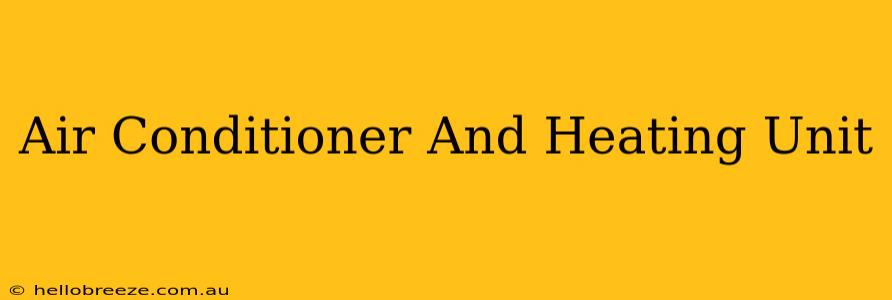Maintaining a comfortable indoor temperature year-round requires a reliable air conditioning and heating unit. This comprehensive guide will explore the key aspects of these essential systems, helping you understand their functionality, maintenance, and the factors to consider when choosing the right one for your home.
Understanding Your HVAC System: Air Conditioners and Heaters
Your home's comfort hinges on the efficient operation of your Heating, Ventilation, and Air Conditioning (HVAC) system. This system typically includes two primary components:
Air Conditioners: Beat the Heat with Efficiency
Air conditioners work on the principle of refrigeration. They absorb heat from the indoor air and release it outdoors, lowering the room temperature. Key components include:
- Compressor: This powerful component circulates refrigerant, the substance that absorbs and releases heat.
- Condenser: This component releases the absorbed heat outdoors.
- Evaporator: This component absorbs heat from the indoor air.
- Expansion valve: This regulates the flow of refrigerant.
Different types of air conditioners exist, each with its own advantages and disadvantages:
- Central air conditioners: These systems are ideal for whole-house cooling and offer consistent temperature control.
- Window air conditioners: A cost-effective solution for cooling individual rooms.
- Portable air conditioners: Offer flexibility but may be less efficient than other options.
- Ductless mini-split systems: These systems are becoming increasingly popular for their energy efficiency and zoning capabilities.
Heating Units: Stay Warm and Cozy All Winter Long
Heating units provide warmth during colder months. Common types include:
- Furnaces: These systems heat air and distribute it throughout the home via ductwork. Fuel sources include natural gas, propane, and electricity.
- Heat pumps: These energy-efficient systems can both heat and cool your home by transferring heat rather than generating it.
- Boilers: These systems heat water or steam, which is then circulated through radiators or radiant floor heating.
- Electric heaters: These are readily available for individual rooms but tend to be less energy-efficient than other options.
Maintaining Your Air Conditioner and Heating Unit for Optimal Performance
Regular maintenance is crucial for extending the lifespan and improving the efficiency of your HVAC system. Consider these essential steps:
Preventative Maintenance Checklist
- Change air filters regularly: This simple task improves air quality and prevents strain on the system.
- Schedule annual inspections: A professional technician can identify potential issues before they become major problems.
- Clean coils and vents: Clogged coils and vents reduce efficiency and can lead to malfunctions.
- Check refrigerant levels (for AC): Low refrigerant levels can impact cooling performance.
Choosing the Right Air Conditioner and Heating Unit for Your Home
Selecting the right HVAC system depends on several factors:
Factors to Consider Before Purchase
- Home size and layout: The system's capacity should match your home's square footage.
- Climate: Consider the extreme temperatures in your region.
- Budget: Different systems have varying upfront and operating costs.
- Energy efficiency: Look for systems with high SEER (Seasonal Energy Efficiency Ratio) and HSPF (Heating Seasonal Performance Factor) ratings.
- Fuel type: Consider the availability and cost of different fuel sources.
By understanding the nuances of your air conditioning and heating unit, you can ensure a comfortable and energy-efficient home environment year-round. Remember to prioritize regular maintenance and choose a system that best suits your specific needs and budget. Investing in a quality HVAC system is investing in your comfort and well-being.

